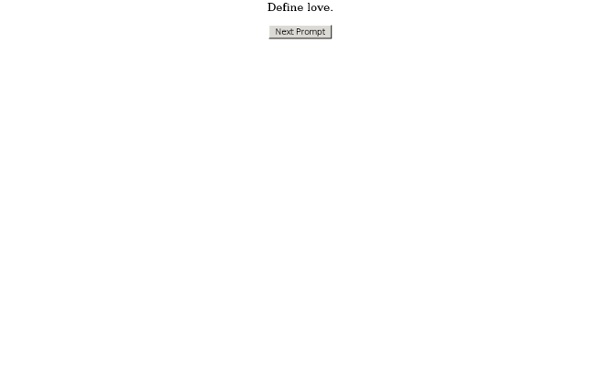



http://www.creativity-portal.com/prompts/imagination.prompt.reload.html
60 Awesome Search Engines for Serious Writers June 20th, 2010 Finding the information you need as a writer shouldn’t be a chore. Luckily, there are plenty of search engines out there that are designed to help you at any stage of the process, from coming up with great ideas to finding a publisher to get your work into print. 95 Questions to Help You Find Meaning and Happiness post written by: Marc Chernoff Email At the cusp of a new day, week, month or year, most of us take a little time to reflect on our lives by looking back over the past and ahead into the future. We ponder the successes, failures and standout events that are slowly scripting our life’s story. How to Use Commonly Misused Words Steps Method 1 of 17: "Affect" and "Effect" 1Use “effect” as instructed."Effect" is a noun referring to something that happens as a result of something else. E.g., "The antibiotic had little effect on the illness.""Effect" is also a verb meaning to bring something about.
Questionnaires for Writing Character Profiles - Creative Writing Help Enter your e-mail to get the e-book for FREE. We'll also keep you informed about interesting website news. "I have searched the web and used different worksheets, but none have come close to your worksheets and descriptions of (what to do and what not to do). Both courses I have taken have with Creative Writing Now have been amazing. Each time I have learned something new. The one thing I love, you take everything apart and give examples." - Katlen Skye
THE ORIGINAL 365 DAY WRITING CHALLENGE LIST [updated] EDIT: The prompts do not have to be done in order (although I recommend it)--you just can't repeat the same prompt. I suggest doing them in order, as it's more challenging, but if you want to take it a bit easier on yourself, post the list of prompts in your member journal and cross them out as you do them. It will not affect the prize. Thank you! I divided the prompts by week, so I will post them 4 weeks per post. Weeks 1-4... A 12-Day Plan of Simple Writing Exercises It’s the perfect time to restart your engine and get back into writing. Here, I offer up a 12-day plan of simple writing exercises to help you keep your creative juices flowing without eating up too much of your time. Follow this plan and in less than half a month, you’ll not only be impressed with what you’ve accomplished, but you may also have something worth publishing. The 12-Day Plan of Simple Writing Exercises Day 1: Write 10 potential book titles of books you’d like to write.
Character Trait Chart Character Trait Chart and Personality Components It can sometimes be helpful to make a Trait Chart for each character. This is especially helpful during the early stages of character development, before the character becomes as real to you as your mother. There are several charts of this sort available, some extremely detailed and some containing only facts and figures. I've tried to make one that includes the most important traits to help you visualize your character, both physically and emotionally. Journal Writing Topics A collection of journal writing topics, journal writing ideas and journal writing prompts to inspire you and get the creative juices flowing. Pick one for your creative writing journaling from the list of journal writing topics below. Journal writing topics to get you started A diet journal.
Creative Writing For Dummies Cheat Sheet Rewriting and editing helps to tighten up your work. But it can be difficult – what to chop and when to stop may not be clear, and you may change your mind more than once during the process. Ask yourself whether you need to take out: Unnecessary information and explanation. Passages of dialogue that go on too long. 6 Ways to Hook Your Readers from the Very First Line Although I consider myself an avid reader, I must admit I have a short attention span when it comes to getting into books. If you fail to grab my attention in the first few lines, I start spacing out. Most readers are like me. Most people don’t want to spend the first 50 pages trying to get into a book. Here are a few things I find annoying in the first lines of a story: Dialogue. 365 Pictures Daily Photo Prompts Generated for Your Creative Inspiration! Writing Prompts : 365 : 365 Creative Picture Prompts, Prompt-a-Day Generator One picture and text prompt per day to inspire your creative life. Visit again tomorrow for February 5, 2015
Themes & Things To Keep In Mind When Writing Fantasy Stories and... - StumbleUpon This list is far from complete. It’s not even trying to be complete. It knows better than that. It just wants to be helpful and provide some inspiration here and there; you know, offer little suggestions that might lead to bigger ideas. (Especially by using the words offered as Wikipedia searches!) Feel free to make suggestions in the comments! Spice Up Your Writing With Dialogue by Judy Cullins Does your chapter sound like a report? Does it go on and on with past tense sentences that tell, rather than show? To spice up your self help, non-fiction or fiction book and even promotional writing, you need to use much more dialogue. Why? Because dialogue presents your story through your characters' hearts and minds.
Daily Writing Prompts Writing Prompt 365 The End Write about new beginnings in your life that you eagerly anticipate. These writing prompts were an experiment in cultivating a habit and maintaining it for 365 days straight.